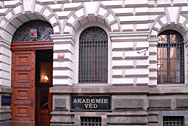
Some time this summer we will probably start to itch – that’s what happens in summertime – we get itches. They could be caused by mosquito bites, allergies, visits by relatives we have never really liked – who knows? But be careful, one of those itches might be scribendi cacoethes, the itch to write. Don’t use medicine! The cure is simple: pick up pen and paper, and start to write.
A student paper suggested that getting this itch is natural. The student said that while contemplating the pen she held in her hand, she imagined a Stone Age ancestor squatting on his haunches and scratching marks in the sand with a short stick: a form of primitive writing. That image made me think that writing is a mark of our humanity, more than a birthright, and perhaps our destiny, and it’s perfectly natural.Starting to write, however, stymies many of us. Garrison Keillor joked about it, saying that everything would be easier in writing if we could only start halfway through. Larry McMurtry thinks getting started paralyzes would-be writers because we "expect too much of a first sentence." He suggests we think of the first sentence "as a good country breakfast: what we want is something simple, but nourishing to the imagination. Hold the philosophy, hold the adjectives, just give us a plain subject and verb and perhaps a wholesome, nonfattening adverb or two."
Once you get started, stay open to ideas. Speak freely about your subject, forget the rules and errors – you can correct mistakes later. Don’t expect to know in advance everything you are going to write. Writing never works that way; writing is discovery. It’s often been claimed that exciting "hidden" ideas come to the writer only in the act of writing. Believe it. And embrace what John Dewey said: "There is all the difference in the world between having something to say, and saying something [on paper]."
Now, I’m going to tell you a secret, Andrea Barrett’s secret. First, I’ll tell you a bit about her. She studied biology in college, and zoology in graduate school. In her novels, she writes about botanists, oceanographers, and geologists. So she’s a scientist-novelist, and says, "it’s hard to explain how much one can love writing."
Love writing? Many of my students and friends consider writing a witch’s curse of drudgery, punishment, and torture. "I hate writing," they say. I ask them, "Have you ever written anything other than a report, examination, letter, or email?" "No," and then they add, "and I don’t want to either." Their disregard for a natural, creative act flabbergasts me. So I guess I’ll pass on Ms Barrett’s secret to you, not to them: "If people knew how happy it can make you, we would all be writing all the time. It’s the greatest secret of the world."
I’m looking forward to my summertime itch. I hope you’ll get the itch, too. I hope you’ll find "the greatest secret of the world." I’ll loan you my pen.
Last month I asked you if I or me should complete this sentence: "She loves chocolate more than ___." Both are correct, but it depends on the meaning of the sentence. If the sentence ends with me, it means that she loves chocolate more than she loves me. That’s a pity. If the sentence ends with I, it means that she loves chocolate more than I love chocolate. I think I had better buy her some chocolate.
RICHARD HAAS,
Oddělení studia jazyků ÚJČ AV ČR, v. v. i.












 English
English
